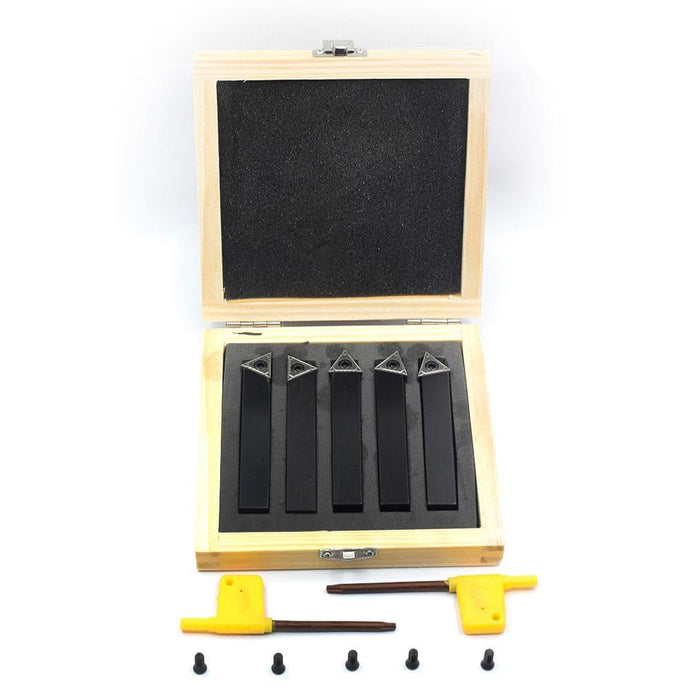
In the realm of metalworking, achieving precision and efficiency requires the right tools, and few tools are as critical as carbide metal lathe tools. These tools have become essential for machinists and manufacturers alike, offering unparalleled performance in shaping, cutting, and finishing metal components. With their ability to handle high-speed operations and deliver accurate results consistently, carbide lathe tools have transformed the landscape of modern machining. Their superiority over traditional high-speed steel (HSS) tools, in terms of both performance and durability, makes them a go-to choice for industries that rely on precision engineering and cost-effective manufacturing.
Carbide metal lathe tools are crafted from a combination of tungsten carbide and a binding material, such as cobalt. Tungsten carbide is known for its remarkable hardness, second only to diamond, and this hardness is what gives carbide tools their ability to withstand the demanding conditions of machining. Whether cutting through tough metals like stainless steel, titanium, or hardened alloys, carbide lathe tools maintain their sharpness and cutting ability for extended periods. This longevity is one of the major reasons why they have gained such widespread use in industries where minimizing downtime and maximizing tool life are critical factors.
One of the primary benefits of carbide lathe tools is their ability to cut through materials at higher speeds than their HSS counterparts. In a typical lathe operation, where the cutting tool rotates or moves against the workpiece, the speed at which the tool operates has a direct impact on productivity and surface finish. Carbide tools can operate at much higher cutting speeds due to their ability to withstand heat without losing hardness. The heat generated during high-speed operations can often degrade less durable materials, leading to premature wear and loss of cutting accuracy. In contrast, carbide tools maintain their integrity even at elevated temperatures, allowing machinists to work faster and more efficiently without compromising precision.
Durability is another hallmark of carbide metal lathe tools. When machining, especially when working with hard metals or high-strength alloys, tools are subjected to immense wear and stress. Traditional tools can become dull, chipped, or worn out relatively quickly, requiring frequent replacements that lead to costly interruptions. Carbide tools, however, are highly resistant to wear, chipping, and deformation, significantly extending their useful life. This durability translates into fewer tool changes, less downtime, and ultimately, greater cost savings for manufacturers. The reduced need for constant replacements also makes carbide tools a more environmentally sustainable option, as fewer resources are consumed in their production and disposal.
In addition to their durability and speed, carbide metal lathe tools offer a level of precision that is critical in modern machining processes. As industries like aerospace, automotive, and medical manufacturing push for ever-tighter tolerances and finer surface finishes, the need for tools that can deliver these exacting results becomes paramount. Carbide tools, with their superior hardness and edge retention, allow machinists to achieve the fine finishes and dimensional accuracy required in these advanced applications. Whether cutting intricate parts or producing smooth, flawless surfaces, carbide lathe tools ensure that the end product meets the high standards of modern engineering.
Carbide tools are also highly versatile, available in a wide range of shapes and sizes to suit different machining operations. From turning and facing to threading and grooving, carbide lathe tools can be designed for specific tasks, ensuring optimal performance for each operation. Furthermore, carbide tools can be customized with coatings such as titanium nitride (TiN) or titanium carbonitride (TiCN), which enhance their wear resistance and performance. These coatings reduce friction, improve heat dissipation, and protect the tool from oxidation, further extending the life of the tool and enhancing its ability to handle demanding machining environments.
The cost-effectiveness of carbide metal lathe tools is another factor driving their adoption. While the initial cost of carbide tools may be higher than that of traditional HSS tools, their longer lifespan and superior performance make them more economical in the long run. By reducing the frequency of tool changes, lowering maintenance requirements, and increasing productivity through faster cutting speeds, carbide tools provide a greater return on investment for manufacturers. In industries where time is money, the efficiency gained through the use of carbide lathe tools can make a significant difference in profitability.
In summary, carbide metal lathe tools are an indispensable asset in the modern machining world. Their unmatched hardness, durability, and precision make them the ideal choice for working with a wide range of metals and alloys. As industries continue to demand higher performance and tighter tolerances, the role of carbide tools in achieving these goals is only expected to grow. Whether for high-speed production runs or intricate precision work, carbide lathe tools offer the reliability and efficiency needed to meet the challenges of today's manufacturing landscape.